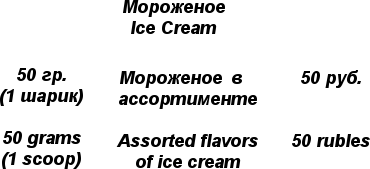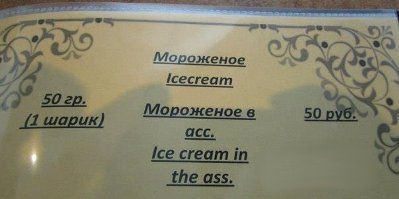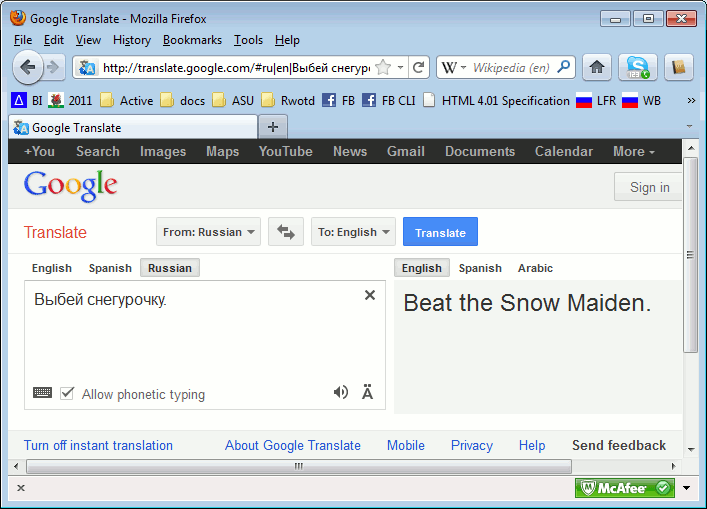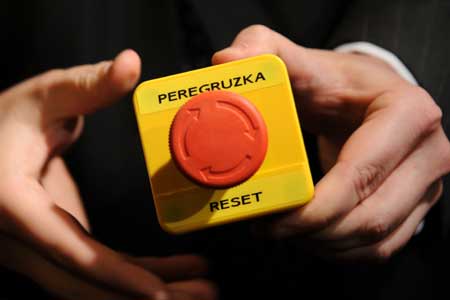Category: "Translation blunders"
Ассортимент
Last summer in Kazan I was at a little restaurant with a friend, and after dinner we ordered tea, and to complement it we ordered a little plate containing «сухофрукты в ассортиментe» ‘assorted dried fruits.’

They also offered a plate containing «конфеты в ассортименте» ‘assorted candy.’

Ah, what a joy! Eat a full meal, and then rest a bit, have a bit of tea, and see what space opens up for a bit of dried apricot or an almond or a bit of chocolate. «Ах, какая благодать!» “Oh, what bliss!”
Thus we see that the word for ‘assortment’ in Russian is ассортимент, which declines like this:
| Sg | Pl | |
| Nom | ассортимент | ассортименты |
| Acc | ||
| Gen | ассортимента | ассортиментов |
| Pre | ассортименте | ассортиментах |
| Dat | ассортименту | ассортиментам |
| Ins | ассортиментом | ассортиментами |
It can be used as a noun in the meaning of ‘assortment’ or ‘range’ or ‘number’:
| В этом ресторане большой ассортимент мясных блюд. | This restaurant has a large assortment of meat dishes. |
| В этом году наша фирма расширяет ассортимент высококачественных товаров на пятьдесят процентов. | This year our company is expanding our range of high-quality goods by fifty percent. |
In English we might buy a box of ‘assorted chocolates,’ or an organic farm might offer weekly boxes of ‘assorted vegetables.’ The Russian equivalent of ‘assorted’ is the prepositional phrase «в ассортименте», literally ‘in an assortment.’ Thus we have:
| мороженое в ассортименте | assorted flavors of ice cream |
| вино в ассортименте | assorted wines |
| цветы в ассортименте | assorted flowers |
Let's assume that you are in a Russian restaurant, and their menu offers assorted flavors of ice cream, and let's assume they are trying to make their menu tourist-friendly. They could put it like this:

But you know, ассортимент is kind of a long word, and a menu only has so much space, and sometimes translators are not entirely aware of the cultural equivalents of what they want to say, so sometimes we get odd results. Consider this menu that someone found during the recent Sochi Winter Olympics:

Alas, I wish I could say that this was the only occurence, but there was also

and also

I imagine that after these menus hit the net, the translator must have felt like an ... Oh, never mind.
Beat the Snow Maiden!
I was in an office supply store last summer to buy some paper for my printer. I looked over the various types and told the salesclerk that I wanted a packet of paper. She responded by asking how much I wanted. It took me by surprise. A packet is a packet, right? It turns out that this office supply store was right next to the architectural university, and its most constant clients are students who generally can't afford to buy an entire package of paper, so they buy a hundred or two hundred grams of paper. Heck, the paper had to last me all summer, so I told the clerk I wanted an entire ream, and she shouted to the cashier:
| Танечка, выбей Снегурочку! | Tanya, beat the Snow Maiden! |
I was much amused. If you doubt the accuracy of my initial interpretation, take a look at what I got when I ran the same phrase through Google Translate:

Now this was summer time in Russia, so there was no snow on the ground, thus the thoughtful reader might expect that despite the omniscience of Google, the translation might somehow be lacking. The thoughtful reader would be correct. The brand of paper I was purchasing was named Снегурочка. The verb выбивать/выбить in addition to meaning ‘to beat’ also means ‘to print symbols on a cashier’s recipt.’ In other words, the clerk was saying, “Tanya, print out a receipt with one packet of Snegurochka paper on it.”
The cashier did so. I carried the receipt the two meters from the cashier to the clerk. The clerk took the receipt, made a small tear in it to show that it should not be used again, and then she gave me an entire ream of Snegurochka paper.
Не (часть вторая)
After two weeks of studying Russian every student knows that не means not. Thus «Я не говорю по-русски» means “I do not speak Russian.” Seems pretty simple. Nonetheless, не can sometimes be misleading because Russians often use не in offers/suggestions to make them softer, more polite, less pushy. Consider the following sentences and translations:
| Не хочешь пойти в кино? | Would you like to go to the movies? |
| Не хочешь чая? | Would you like some tea? |
| Не будем смотреть телевизор? | Shall we watch TV? |
| Не передашь мне журнал? | Could you hand me the magazine? |
Notice that none of the English translations have ‘not’ in them. The не in the Russian sentence simply makes the request a bit more polite, and therefore the best translation of such sentences often contains could or would in them.
Notice that a beginner might be tempted to translate «Не хочешь чая?» as “Don't you want some tea?” That would be a bad translation. When an English speaker asks “Don't you want some tea?”, he is asking because he is surprised that the other person doesn't seem to want tea.
Злой
Злой is an adjective that beginners trip over for several reasons. First off, it is so short that it looks funny and they can't really believe that it's not longer:
| Masc | Neut | Fem | Pl | |
| Nom | злой | злое | злая | злые |
| Acc | * | злую | * | |
| Gen | злого | злой | злых | |
| Pre | злом | |||
| Dat | злому | злым | ||
| Ins | злым | злыми | ||
| Short forms | Comparative | |
| Masc | зол | злее |
| Fem | зла | |
| Neut | зло | |
| Pl | злы |
Very often beginners memorize the word as meaning “wicked.” That's true as far as it goes:
| Сталин был злым диктатором. | Stalin was an evil dictator. |
However the word very often just means “mean” or “angry”:
| Не старайся погладить нашу кошку. Она очень злая и сразу укусит тебя. | Don't try to pet our cat. She's really mean and will bite you without warning. |
| Вчера отбуксировали мою машину из парковки. Какой я был злой! | Yesterday they towed my car from the parking lot. I was so angry! |
Перегрузка ≠ перезагрузка
Last week Secretary of State Hillary Clinton met with Russian Foreign Minister Sergei Lavrov. The Obama administration wants to “push the reset button” on relations with Russia, and someone had the cutesy idea of presenting Lavrov with a large button with the word “reset” printed on it in Russian and English. The word they printed on it was перегрузка, which, alas, does not normally mean reset. It can mean “cargo transfer” or “overload,” but it can't mean “reset.” (Lavrov said it meant “overcharge,” which probably caused a lot of confusion. It doesn't mean charging too much money.)
Secretary Clinton said “We worked hard to get the right Russian word.” Oh, really? You worked hard to get one word right? And you still failed? If you had asked one single Russian person, you could have had it right. Would that really have been so much work? If they worked really hard and still couldn't get a single word of Russian right, I'm not sure there is much hope for improvement over the previous eight years of pathetic foreign policy blunders.
One might think that had former Secretary of State Condoleezza Rice been involved, she might have caught the error since she spoke some Russian. The American press has often stated that she spoke fluent Russian, but quotes in the Russian press indicate that her spoken Russian was only mediocre. Would she have caught an error in a non-political word? Probably not.
Okay, now that I have had my obligatory moment of cynicism, there is a kinder angle. One word for reset is перезагрузка. All it would take was a typographical error of leaving out the middle -за- to end up with перегрузка. An embarrassing error, yes, and a sign that the cutesy prop was likely part of a last minute effort, not an actual bit of careful diplomacy. That said, I think I can still give the current administration the benefit of the doubt.

Photo of Clinton's reset button. To add insult to incompetence, the Russian word was printed in English letters. How tacky is that?
Follow-up, Tuesday, March 10, 2009: I have now heard from several sources that some Russians will use перегрузить instead of перезагрузить in the meaning of “reboot a computer”; the corresponding noun form would be перегрузка instead of перезагрузка. Other more stylistically careful Russians respond and say, “Oh, no, you can't ever say that in that meaning.” I place this dissonance in the same category as the English error, “I itched the back of my hand until it turned red.” Standard English requires “scratched” not “itched” in this context, but I have heard (less educated) native speakers of English say it. To my ear it sounds absolutely wrong, but some people say it. So the appearance of “peregruzka” on Clinton's rest button may have had one of two sources: a typo for перезагрузка, or her informant might have been someone who thought, “Well, sometimes we say it перегрузка” and just made a lousy stylistic choice.
Follow-up, Tuesday, March 19, 2009: Amusing spoofs on the button are appearing all over the web.
Follow-up, Saturday, October 31, 2015: here's another article that references the incident.